
- Subject:
- Psychology
- Material Type:
- Unit of Study
- Provider:
- Rice University
- Provider Set:
- OpenStax College








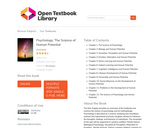
The first chapter provides an overview of the textbook and reviews the history of psychology and its methodology. Psychology is described as a science studying how hereditary (nature) and experiential (nurture) variables interact to influence the thoughts, feelings, and behavior of individuals. The remainder of the text will be organized in sections entitled “Mostly Nature” (Biological Psychology; Sensation & Perception; Motivation & Emotion), “Mostly Nurture” (Direct Learning; Indirect Learning (i.e., observational learning and language); Cognition), and “Nature/Nurture” (Human Development; Personality; Social Psychology; Maladaptive Behavior; Professional Psychology and Human Potential).
Table of Contents
Chapter 1: The Science of Psychology
Chapter 2: Biology and Human Potential
Chapter 3: Sensation, Perception and Human Potential
Chapter 4: Emotion, Motivation and Human Potential
Chapter 5: Direct Learning and Human Potential
Chapter 6: Indirect Learning and Human Potential
Chapter 7: Cognition, Intelligence and Human Potential
Chapter 8: Lifespan Development of Human Potential
Chapter 9: Personality and Human Potential
Chapter 10: Social Influences on the Development of Human Potential
Chapter 11: Problems in the Development of Human Potential
Chapter 12: The Science of Psychology and Human Potential

The first chapter provides an overview of the textbook and reviews the history of psychology and its methodology. Psychology is described as a science studying how hereditary (nature) and experiential (nurture) variables interact to influence the thoughts, feelings, and behavior of individuals. The remainder of the text will be organized in sections entitled “Mostly Nature” (Biological Psychology; Sensation & Perception; Motivation & Emotion), “Mostly Nurture” (Direct Learning; Indirect Learning (i.e., observational learning and language); Cognition), and “Nature/Nurture” (Human Development; Personality; Social Psychology; Maladaptive Behavior; Professional Psychology and Human Potential).



This textbook provides standard introduction to psychology course content with a specific emphasis on biological aspects of psychology. This includes more content related to neuroscience methods, the brain and the nervous system. This book can be modified: feel free to add or remove modules to better suit your specific needs.Please note that the publisher requires you to login to access and download the textbooks.
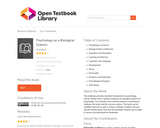
This textbook provides standard introduction to psychology course content with a specific emphasis on biological aspects of psychology. This includes more content related to neuroscience methods, the brain and the nervous system. This book can be modified: feel free to add or remove modules to better suit your specific needs.Please note that the publisher requires you to login to access and download the textbooks.
Table of Contents
Psychology as Science
Biological Basis of Behavior
Sensation and Perception
Learning and Memory
Cognition and Language
Development
Social
Personality
Emotions and Motivation
Psychological Disorders
Well-Being
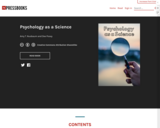
This resource compilation and activity development was designed to serve the Psychology as a Science course at Washington State University. This book is designed as a resource for instructors, but should not be assigned to students as-is. All activities were co-authored by Amy T. Nusbaum and Dr. Dee Posey and are licensed CC-BY-SA. The activities are designed using an inquiry framework, encouraging students to think with the mindset of a scientist. All resources are owned by their individual authors – we link to them merely for convenience. The hope for this resource is that instructors can easily create custom reading lists for their own courses that are free for students.
Table of Contents:
I. RESEARCH PROCESS AND DESIGN
1. Pseudoscience
2. Case Studies
3. Correlational Designs
4. Ethics
5. Falsifiability
6. Reproducibility and Open Science
7. Scientific Method
II. STATISTICS
8. Displaying Data
9. Scales of Measurement
10. Effect Size
11. P-values
12. Sample Size
III. INFORMATION IN THE REAL WORLD
13. Evaluating Sources
14. Fake News
15. Reading Journal Articles
16. Secondary Reporting of Research
17. Memory Errors
18. Heuristics and Decision Making

Provides standard introduction to psychology course content with a specific emphasis on social aspects of psychology. This includes expanded content related to social cognition, aggression, attraction and similar topics.
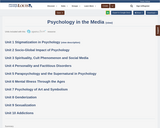
The study of historical and cultural influences of psychology via the media. (ex. – film, literature, pop culture)
This course is available on Canvas Commons:
https://lor.instructure.com/resources/cda397134506431198d6ed39e13ccabb
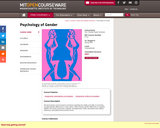
Examines evidence (and lack thereof) regarding when and how an individual's thoughts, feelings, and actions are affected by gender. Topics include: gender development; gender differences in cognition and emotion; gender stereotypes; how gender is related to physical and mental health, sexuality, close relationships, and work.
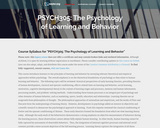
This course introduces learners to the principles of learning and behavior by surveying relevant theoretical and empirical approaches within psychology. The overall emphasis is on the theoretical foundations of psychology as they relate to human learning and behavior. Upon successful completion of this course, the student will be able to: identify major historical timelines and perspectives associated with learning theory; explain foundational concepts associated with learning theory; integrate common principles of learning theory into larger domains of psychology; align major theorists with specific contributions to psychology of learning and behavior; analyze and describe empirical research as it relates to effectiveness of learning and behavior management techniques; identify the utilization of psychology of learning and behavior in domains outside the field of psychology. This free course may be completed online at any time. (Psychology 305)
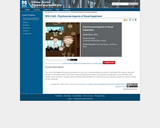
This course investigates the psychosocial aspects of vision loss. Coping techniques and issues of self-esteem are explored, along with principles of self-determination. Other topics include the psychosocial aspects of personal life management such as orientation and mobility, use of volunteers, sexuality, and the Americans with Disabilities Act. Psychosocial issues specific to people from diverse cultures are also addressed.